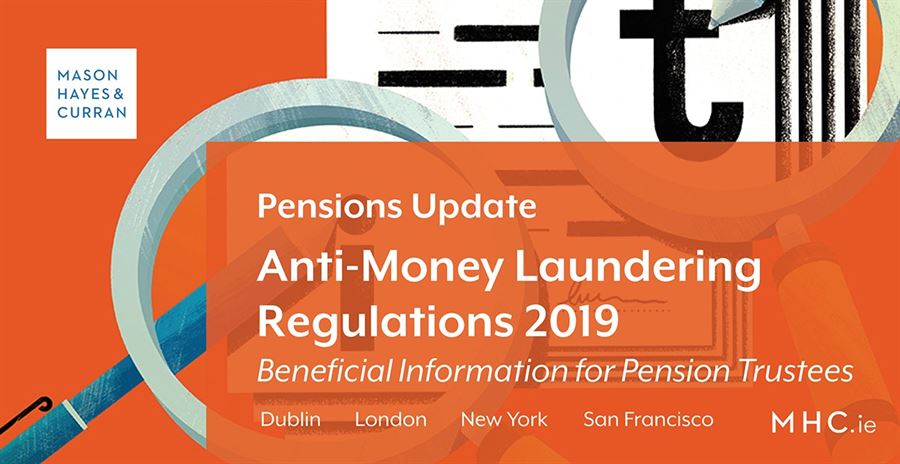What is covered by the Regulations?
The Regulations apply to all trusts covered by the definition of "an express trust whose trustees are resident in the State or which is otherwise administered in the State", with no exemption provided for trust based pension schemes.
The Regulations are aimed primarily towards the identification of beneficial owners, the definition of these owners is of importance. It covers the settlor, trustees, protector (if any), beneficiaries or other persons in whose main interest the trust is set up or operates for, and any individual who has ultimate control over the trust by means of direct or indirect ownership or by other means. This is quite broad, and could cover a huge number of parties in the context of a trust-based occupation pension scheme.
What are the new obligations?
 Information
Information
Trustees are required to take all reasonable steps to hold “adequate, accurate and current” information on the beneficial owners of the trust, including name, date of birth, nationality and residential addresses.
Register
After the information on the beneficial owner has been collected, the trustee(s) is then obliged to use this information to establish a “beneficial ownership register”. In addition to the information on each beneficial owner, the register must log the date on which each owner was entered onto the register and the date they cease to be an owner.
For the moment, this register is to be maintained at a local level. Each trust must have a register maintained by its trustee(s). However, the Companies Registration Office is expected to launch a Central Register of Beneficial Ownership (‘CRBO’) during the second quarter of 2019. It is anticipated that the CRBO will be available for inspection by those demonstrating a legitimate interest in obtaining information on the beneficial owners.
Records
This obligation states that a trustee must keep a record of actions undertaken to identify the beneficial owners of the trust. The records must be kept for the duration of the trust and for a further period of not less than 5 years after the date of the last distribution of the trust. At the end of this period, the trustee must make arrangements for deletion of the records, unless otherwise required by law or with the consent of those persons to whom the information relates.
Designated persons
The final obligation is for trustees to inform designated persons when entering into occasional transactions. The duty obliges a trustee to inform the designated person in writing that it is acting as a trustee provide information identifying all the beneficial owners of the trust if requested. The definition of designated person is taken from the Criminal Justice (Money Laundering and Terrorist Financing) Act 2010, while an occasional transaction is one which a designated person is obliged to undertake due diligence for under the same act. This obligation can arise when entering into services with businesses such as financial institutions, legal professionals and accountants.
What does this mean for pension schemes?
The Regulations introduce a set of quite onerous tasks for trustees, given the nature of trust based pension schemes, in particular their inclination towards having numerous and varied beneficial owners. Identification will be a challenge for trustees, before even considering the requirement to then collate data. In light of modern awareness of data protection and the potential for employees to considered beneficial owners, the availability of this information on a register may cause sensitive issues for both trustees and employers. The obligation to inform must also be carefully considered by trustees, as it may impact on the ability to engage commercial services for the scheme.
The Regulations must be considered with the utmost seriousness, as failure to comply is a criminal offence. A trustee who fails to comply with the provisions of the Regulations can be summarily convicted, and can be liable for a class A fine of up to €5,000.
Conclusion
The Regulations are operative immediately, with no grandfathering or exempting provisions. Therefore, the obligation to comply already exists for pension scheme trustees, notwithstanding the fact that Central Register of Beneficial Ownership has yet to be launched by the CRO.
The introduction of the new Regulations comes at a time when the Irish pensions industry is already in a state of flux due to the implementation of the IORP II directive. While introducing compliance with two significant pieces of legislation is certainly a burdensome challenge for trustees and employers, the new regimes being so close together in implementation brings the opportunity to dovetail efforts towards compliance. This is possible as a result of both the Regulations and IORP II being geared towards better administration and a proactive approach to governance. It should be remembered that time is ticking. Stakeholders are therefore advised to act immediately to consider the Regulations, the impact they will have on their pension scheme and the actions required to ensure compliance.
To discuss the impact of the new Regulations in more detail, contact a member of our Pensions team.
The content of this article is provided for information purposes only and does not constitute legal or other advice.







